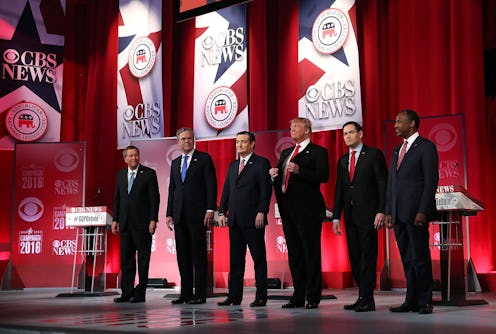News
Here's Why The South Carolina Primary Is Important
Iowa and New Hampshire have cast their votes, and it'll soon be South Carolina's turn. A lot is riding on the first-in-the-South primary, and while the polls do show two clear frontrunners, this cycle has proved that we really can't take anything for granted. Here's why the South Carolina primary is so important.
For Republicans, South Carolina may be the last chance to stop Trump. There are essentially two categories of candidates in the GOP race: outsiders like Ted Cruz and Donald Trump, who appeal more to the grassroots, and establishment figures like Jeb Bush and John Kasich, who appeal to big-dollar Republican donors and other power brokers in the party. This has resulted a two-lane race for the GOP nomination, with candidates like Cruz and Trump competing over a much different subset of Republican voters than Bush, Kasich, and Marco Rubio.
The establishment very much wants to prevent Cruz or Trump from getting the nomination, but this effort hasn't been going well. It's not just that Cruz and Trump won the nominating contests in Iowa and New Hampshire, although that is certainly a concern to Republican elites. What's more of a concern, though, is that none of the remaining establishment candidates have been able to break out of the pack and give Trump or Cruz a serious run for their money. Instead, they're competing with one another, and that's helping Trump and Cruz.
By the way, this has been going on for the entire 2016 cycle. Before the campaign started, a good chunk of Republican power brokers had pegged their hopes to Jeb Bush. When Jeb's campaign got off to a rocky start, many GOP apparatchiks instead lined up behind Scott Walker. But then Scott Walker bungled his campaign and dropped out due to lack of money, at which point Marco Rubio stepped up from the dugout to assume the mantle of GOP establishment pick. Rubio, however, never picked up steam in the polls, and his surprisingly strong third-place finish in Iowa was immediately neutralized by his disastrous debate performance and subsequent crushing defeat in New Hampshire.
With Chris Christie's exit from the race, this leaves John Kasich as the last potential establishment Republican who hasn't yet flamed out. Kasich came in second after Trump in the New Hampshire primary, and that might have been a good thing — if, that is, he wasn't an Obamacare-expanding heretic with little to no campaign organization beyond New Hampshire and his home state of Ohio. The GOP establishment may like Kasich, but his lack of infrastructure and acceptance of part of Obamacare make him unlikely to win enough primaries to clinch the nomination.
Meanwhile, Cruz won the Iowa caucuses, Trump cruised to victory in New Hampshire, and they're polling in first and second place in South Carolina. Trump is now indisputably the frontrunner for the GOP nomination, and if he wins again in South Carolina, he will have solidified that status.
In order for Trump or Cruz to fall, one of the other candidates has to defeat them. It's certainly possible that Kasich, Bush, or Rubio could beat Trump or Cruz in a one-on-one matchup, but that matchup won't even happen as long as all three of them stay in the race. And all three of them will stay in the race, so long as each one believes that they have a chance of defeating the other two. The ironic thing, of course, is that this dynamic reinforces itself endlessly, and it almost ensures that the establishment candidates in the GOP will not succeed in preventing a Trump or Cruz nomination.
South Carolina is important, then, because it's one of the last chances for the Republican Party to halt Trump's momentum. This doesn't mean they have to defeat Trump; it simply means that one of the Trump and Cruz alternatives needs to somehow break away from the others, perhaps defeating Ted Cruz with a strong second-place showing, and position themselves as the consensus choice for the GOP elite. If that doesn't happen in South Carolina, it's hard to see how the party can possibly stop Donald Trump from marching unimpeded to the Republican nomination.
The Palmetto State matters to Democrats as well, but for a much simpler reason. Hillary Clinton is currently leading Bernie Sanders in the state by a wide margin, and she's almost certainly going to win the primary, because it's a state that's very well-suited to her strengths as a candidate. However, if she somehow manages to lose South Carolina, it's game over for her campaign. From a demographic standpoint, South Carolina is a state she has absolutely no business losing, and if she does, it'll be clear that she simply lacks the support within the Democratic Party to defeat Bernie for the nomination.
In all likelihood, Donald Trump and Hillary Clinton will both win in South Carolina. The results probably won't be terribly surprising, but they could tell us quite a bit about who actually has a chance to win their party's nomination — and who doesn't.
